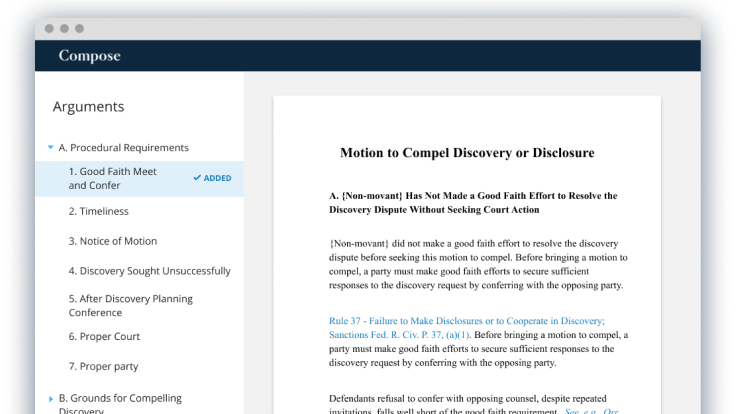Earlier this year, legal research company Casetext launched Compose, a first-of-its-kind technology product that helps you create the first draft of a litigation brief in a fraction of the time it would normally take.
As I reported at the time, the company touted the product as “poised to disrupt the $437 billion legal services industry and fundamentally change our understanding of what types of professional work are uniquely human.”
Now, Casetext is out with a report, Increasing Law Firm Profitability Using Compose Brief-Drafting Technology, that finds that litigators who use Compose are able to draft briefs 76% faster than they otherwise would.
In the self-conducted study, Casetext recruited 13 litigators who had never before used Compose and had them use it to write a brief.
All 13 recruits have worked at Am Law 200 firms or in federal clerkships, Casetext says. They included a former editor-in-chief of the Columbia Law Review, a former clerk for the 9th U.S. Circuit Court of Appeals,and associates from firms such as O’Melveny & Myers and Akin Gump. Casetext paid each participant for two hours of their time.
The participants were given a prompt to write a motion to dismiss for lack of personal jurisdiction based on a scenario Casetext provided. Before starting to write, they were asked to estimate how long it would take them to complete the assignment using their typical brief-drafting process.
The average of these estimates was six hours and 55 minutes, with individual estimates ranging from three to 15 hours.
The participants were then shown a four-minute video introducing them to the Compose platform, and then put to work, with no other training. They were asked to write the brief using only Compose and no other research tools, and to spend no more than two hours writing.
Using Compose, the average time it took them to write the brief was one hour and 41 minutes. This was 76% less than the average time the participants had estimated, or 5.2 hours saved per brief.
After completing the assignment, participants were asked if they thought that using Compose would lead to better, equal or lower quality briefs. All of them said equal or better quality.
They were also asked how they thought Compose would impact the quality of their briefs:
- 62% said Compose would enable them to cite higher quality authorities.
- 69% said they would be less likely to miss an argument.
- 92% said Compose would improve the quality of their briefs in one or both of these areas.
The takeaway, Casetext says, is that by using Compose, attorneys can produce briefs four times faster while improving the quality of the finished brief.
You can see the full report here.
 Robert Ambrogi Blog
Robert Ambrogi Blog